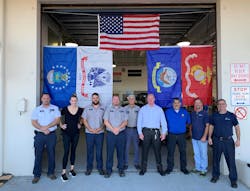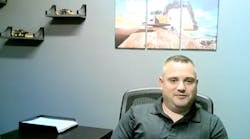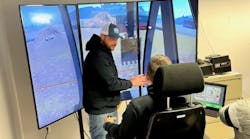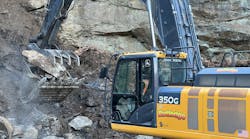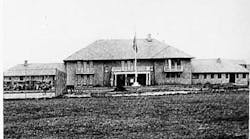When an equipment manager recruits out of the military, they can safely anticipate the type of worker they’re signing on: an individual with a master-level skill set, and a disciplined leadership style.
This rings true for Ron Kennedy, CEM, fleet manager at Sarasota County (Florida), and a veteran of the United States Marine Corps. At Sarasota, Kennedy recruits veterans in addition to active members of the military.
“There’s a certain structure whenever you’re dealing with a veteran,” he says. “They wouldn’t have gotten an honorable discharge or retired out if they weren’t well trained or didn’t have organizational skills. You just don’t get that. So you have that comfort level in knowing whenever you bring one in, that stuff’s already behind you.”
Kennedy is a member of the Construction Equipment Under 40 Awards Class of 2014.
Construction plays a large part in the military—units with fleets and equipment facilities exist in each of the armed forces. Kennedy says if there is a blue-collar or management position that exists on the outside, there’s a job inside that does it.
Most of Sarasota’s military hires are only months away from EAS, or end of active service. Potential recruits are interviewed while they’re still on base. If they’re hired, Sarasota County will hold a position for them until their EAS.
How to hire military veterans
To connect with jobseekers, Kennedy uses an online network geared toward active duty, civilian, and retired military seeking employment from all over the country.
“Whenever we hire a veteran, we’re doing Skype interviews because they’re either active, or they just got out and haven’t moved to the area,” Kennedy says. “We bring in our selected vets, and have some kind of interaction with them. Then we whittle them down to four or five and start scheduling them in for live interviews.”
Kennedy additionally reaches out to MacDill Air Force Base in Tampa with job listings, and will occasionally attend job fairs to hire technicians.
“We try to attract vets to the area with a good job, so I've hired them while they're deployed,” Kennedy says. “People from all over can respond to our listings, it doesn't have to be restricted to Sarasota.”
Since most veterans come into the workforce FEMA (Federal Emergency Management Agency) certified, hiring technicians out of the military guarantees managers are taking on a highly trained individual with strong leadership qualities, according to Kennedy. He sees this as a “huge positive” for fleet work.
“The main thing you’re hiring for is the leadership, which is the most important quality for me,” Kennedy says. “If we hire a technician out of any type of service in the inside, there's little to no technical training with them at all. They’re years into that type of training already.”
Since no additional technical training is necessary following active duty, Kennedy says his only requirement is minimal software-related training.
“No one uses the same maintenance software the same way as Sarasota, and that's our lifeline here,” Kennedy says. “I've hired a couple people that had a little bit of experience with it. But normally out of the military, they just don't run that type of stuff. They're not required to report like we are. That would be the only training portion that we’d have to do.”
What qualities do military veterans have?
In addition to their technical skill set, Kennedy says veterans also bring a number of personal qualities instilled in the military.
“They work well under stress, they can multitask, pay attention to detail, all the big ones,” Kennedy says. “They’re not afraid to make a tough decision either, which is awesome. They always keep going, and 99 percent of them are going to show up, because it’s what the military teaches you to do.”
One of Kennedy’s veteran technicians, James Dowdy, retired from the Marine Corps after working in the automotive arena throughout his entire career. He now runs Sarasota’s fuel program.
“He came in with the skills in his tool belt already,” Kennedy says. “He was pretty much turnkey—I was able to turn my entire program over to him.”
Although Kennedy has drawn inspiration from his own experience as a veteran, being born and raised in a military family contributed to his drive to recruit out of the same pool. He followed in his father and grandfather’s footsteps and served in the Marine Corps.
After turning down an offer to extend his duty in 1997, he found himself in a position similar to others close to EAS, and began searching for a job outside of his base. He started by reaching out to Manatee County, a nearby county.
“I was sending resumes—pretty much handwritten letters because we were in the tent—to Manatee County before I even got out of the service. I wasn't getting any response back, so when I finally got out on terminal (final) leave, I started making phone calls saying I wanted to be part of government.”
After several attempts at contacting Manatee County, Kennedy finally heard back.
“At the time, a retired Army Colonel was the fleet manager for Manatee County,” he says. “He probably just got sick of me bugging him and invited me for a face-to-face handshake interview. Then just luckily enough, a position became available within a week of that conversation. I was pretty lucky.”
Kennedy spent nearly 20 years as Manatee County’s operations chief. In 2016, he decided to take on a fleet management position at Sarasota County.
“I knew what [Manatee] did and how they were always trying to hire vets and had vet preference, so I brought that with me to Sarasota County,” he said. “We have been extremely successful with it here in house.”
Landing a secure job following active duty helped make transitioning out of the military a smoother process for Kennedy. He has felt strongly about paying forward the sentiment at Sarasota.
“You get dumped out into the world, you're clueless; you don’t know whether to go left or right,” Kennedy says. “I’ve always worked for military of some branch—I worked for a retired Air Force Chief Master Sergeant, and currently for a retired Air Force Colonel. I’ve been really lucky to have people behind me that know what a veteran has to offer coming out of the gate.”
At Sarasota, Kennedy has also hired veterans as shop foreman, shop supervisors, operations managers, administrative assistants, and several other titles. His most recent hire, Brianne Lawrence, currently works as an administrative specialist, and served in the Army as a geospatial intelligence imagery analyst. Lawrence’s mapping skills have also come into use on the job, especially during some of Sarasota’s facilities expansions.
“Brianne works with me daily up here, and it’s like turnkey whenever you snag somebody up like that,” Kennedy says. “She came in with a top secret security clearance, and you’re not going to get that unless you’ve been through a very intense background check. We were looking at more of a mixed-use type of position, and her background was a perfect match. We knew it from just looking at what her discharge papers showed.”
Kennedy says he hopes the trend of hiring veterans becomes more widespread in the future. He urges recruiters to reach out to bases and help inform transitioning soldiers.
“Recruiters love to promote jobs on the outside, so it’s good to let people on the inside know, ‘hey we have these jobs that are open and available if you have anybody transitioning out or nearly transitioning out,’” he says. “We get a huge response from them whenever we do that.”
“Any kind of speech I do, or when I'm talking to large groups, that’s one of my ending statements—‘when you’re going through hiring selections and come across a vet, give the vet an opportunity.’”
